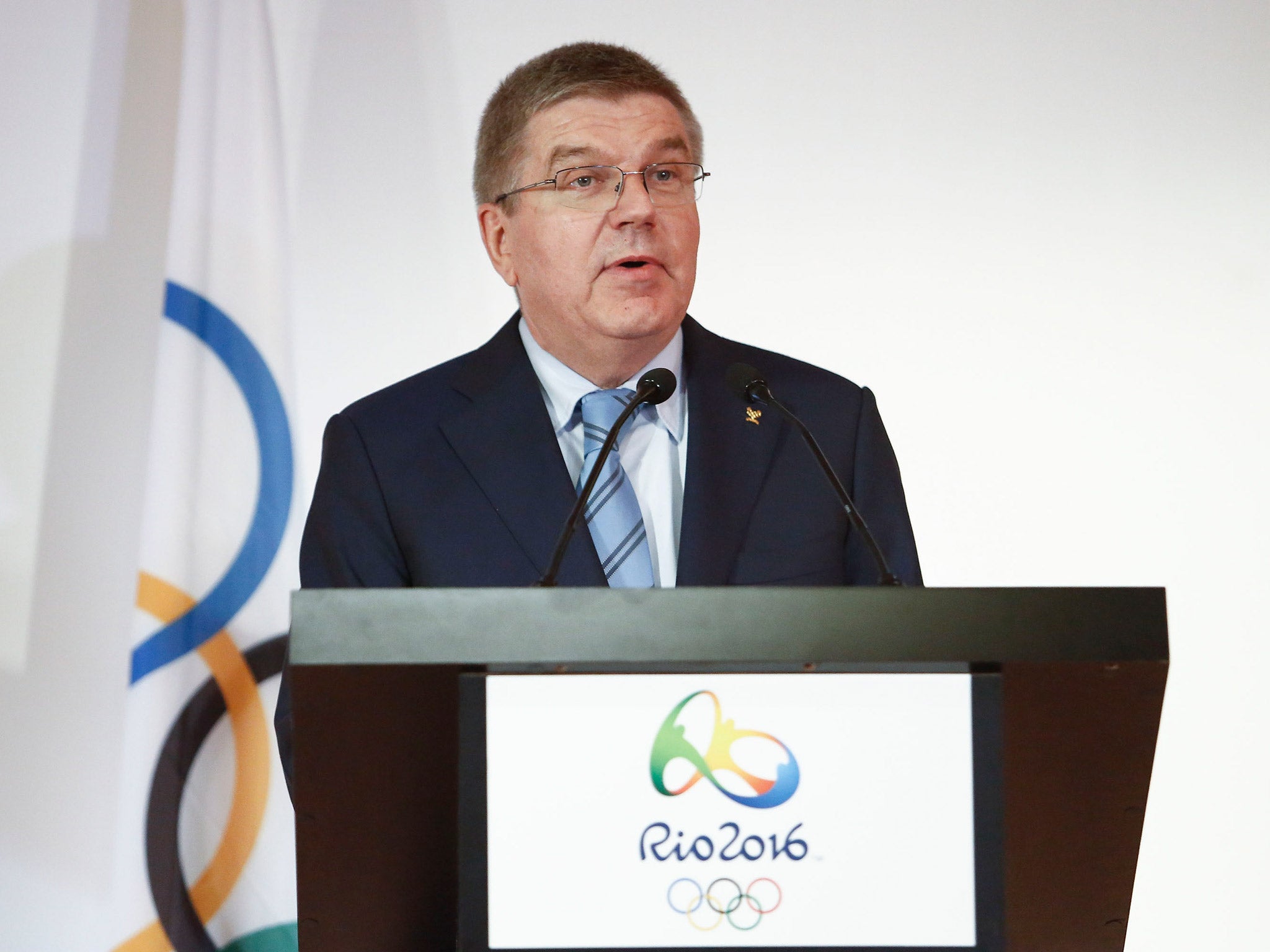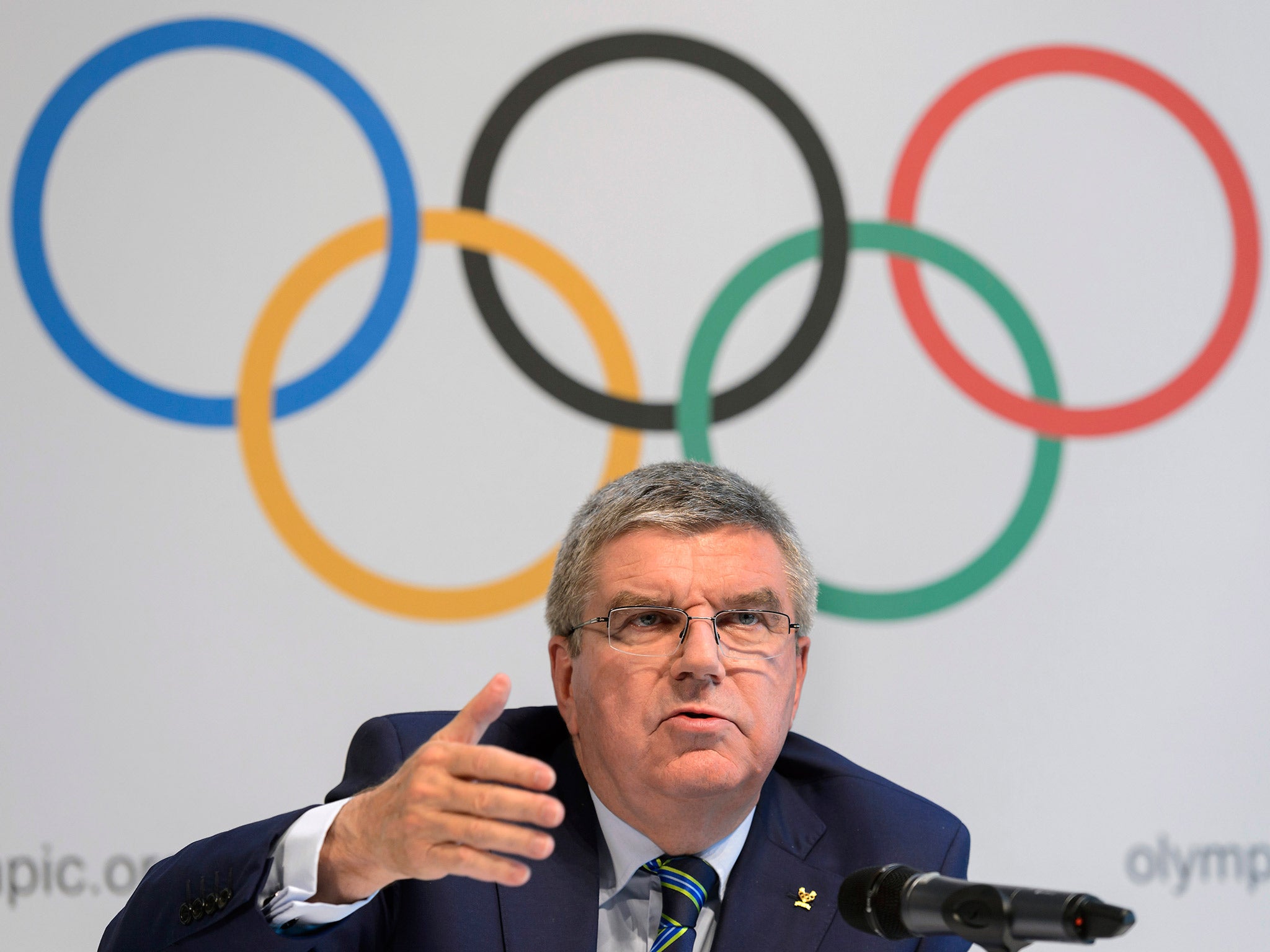Rio 2016: Russia and Kenya athletes must pass 'individual evaluation' and prove their innocence to compete at Olympics
IOC president Thomas Bach said athletes from Russia and Kenya could no longer be 'presumed innocent'

Your support helps us to tell the story
From reproductive rights to climate change to Big Tech, The Independent is on the ground when the story is developing. Whether it's investigating the financials of Elon Musk's pro-Trump PAC or producing our latest documentary, 'The A Word', which shines a light on the American women fighting for reproductive rights, we know how important it is to parse out the facts from the messaging.
At such a critical moment in US history, we need reporters on the ground. Your donation allows us to keep sending journalists to speak to both sides of the story.
The Independent is trusted by Americans across the entire political spectrum. And unlike many other quality news outlets, we choose not to lock Americans out of our reporting and analysis with paywalls. We believe quality journalism should be available to everyone, paid for by those who can afford it.
Your support makes all the difference.Athletes from Kenya and Russia, in all sports, will only be able to compete at the Rio Olympics if they have passed an "individual evaluation" to prove they have not been doping.
This unprecedented step was unanimously agreed at an emergency summit convened by the International Olympic Committee in Lausanne.
With the World Anti-Doping Agency declaring both Kenya and Russia "non-compliant" with its rules, IOC president Thomas Bach said athletes from those countries could no longer be "presumed innocent".
"The conclusion of the summit was that this non-compliance declaration, and the substantial allegations related to it, put very serious doubts on the presumption of innocence for athletes coming from these two countries," said Bach.
"Therefore, each athlete coming from these two countries will have to be declared eligible by their respective international federation following an individual procedure and evaluation of the situation.
"And in this individual evaluation, tests from laboratories that are tainted or non-compliant, cannot be taken into consideration.
"The respective (international federation) will have to take into account other reliable tests, that means international tests, or tests supervised by international authorities."
This decision represents an emphatic vote of confidence for the International Association of Athletics Federations' (IAAF) decision on Friday to maintain the ban on Russia's athletics federation.
Not only did this gathering of international sports federations, national Olympic committees and athletes' representatives support the IAAF stance in its own sphere of influence, it recommended it to the rest of the Olympic movement.

This is represents a concerted effort to get behind the World Anti-Doping Agency's attempt to enforce its Code - the set of anti-doping rules that are meant to govern most elite sports.
The Montreal-based agency has currently declared four countries' anti-doping agencies non-compliant with the Code but two of those, Mexico and Spain, are for largely administrative and legal reasons that are in the process of being rectified.
The situation in Kenya and Russia, however, is very different, as Bach pointed out.
"In Kenya, there were administrative issues that are about to be resolved," he said.
"But on top of this we've had in the last couple of months a lack of funding and - I hope I quote the president of the IAAF (Lord Coe) accurately here - an absence of national testing.
"So Kenya is considered to be a country where the non-compliance affects the doping controls. It is a lack of funding and attention.
"And in Russia, you have serious allegations about the manipulation of the anti-doping system.
"But they both lead to the same challenge and we have to ensure there is a level playing-field."
Bach called this 'Olympic Summit' even before the IAAF met in Vienna last week to confirm that the All Russia Athletics Federation had failed to meet the "verification criteria" needed for reinstatement.
The key issue the summit was meant to address was the balance between collective punishments and individual justice, a dilemma the Olympic movement has been forced to ponder thanks to the remarkable level of cheating uncovered already in Russian sport, with the very real possibility of more to come.
A Wada-funded investigation uncovered the systemic cheating within Russia's athletics set-up last November and that led to the suspension of the Russian federation, anti-doping agency and anti-doping lab.
A second Wada -funded inquiry started last month into allegations of state-sponsored cheating at the 2014 Winter Olympics in Sochi, and its report is expected by July 15.
There is also an investigation into allegations of doping in Russian and Chinese swimming being conducted by that sport's international federation, and pressure is growing on the likes of weightlifting and wrestling to follow suit.
Russia's response to these allegations has initially been denial, only moving to remorse much later, with the caveat that all wrongdoing has been the responsibility of rogue individuals, not the group and certainly not the state.
Russian sports officials and athletes have already said they will fight the IAAF decision, which may result in just a handful of Russian athletes going to Rio in neutral colours, at the Court of Arbitration of Sport, which Bach said was their right.
He did not, however, address the suggestion that Russia might boycott the Rio Games in protest.
Over the last few days, past and present presidents of Wada have said Russia could be thrown out of the Olympics entirely, if the allegations about Sochi are proven.
Former Wada president Dick Pound, who led the investigation into Russian athletics last year, told The Sunday Times that it was "the nuclear option...but not impossible", and current boss Sir Craig Reedie told a conference in London on Monday that the second investigation may present a "precedent-setting opportunity".
As well as the powerful messages sent to Kenya and Russia, Bach said the summit agreed that no athletes found guilty of doping by the retesting of samples from the 2008 and 2012 Games should be selected for Rio, and no coach or doctor involved in cheating should apply for accreditation.
But this year's revelations have clearly rocked the IOC as it also called on WADA to convene an extraordinary general meeting to address the global anti-doping system's obvious flaws in 2017.
Bach said the IOC would get the debate rolling at its next meeting in October, no doubt hopeful that a successful Rio Games will have improved the mood.
PA
Join our commenting forum
Join thought-provoking conversations, follow other Independent readers and see their replies
Comments